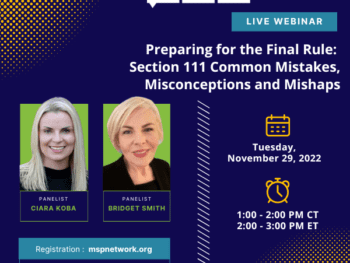LowerWC.com interviewed Christie Luke, vice president of operations at Gould & Lamb, in Bradenton, FL about custodial administration arrangements for Medicare Set-Asides (MSAs). She started off with the basics.
Define Medicare Set Aside
The Centers for Medicare/Medicaid Services (CMS) require their interests be protected prior to any settlement of the medical portion of a claim for qualified individuals. Medicare secondary payer laws are intended to prevent the shift of financial responsibility from primary payers to Medicare. The Medicare Set-Aside Agreement (MSA) allocates a portion of claims settlement for future medical expense, placed into custodial administration.
What is Custodial Administration?
Once a case is settled MSA funds are placed into custodial administration, or “handling,” into either the hands of the claimant (self administration) or with a custodian (professional administration) on the claimant’s behalf. This can include cases sent to CMS for approval, wherein the CMS approval indicates the intent of administration; or in cases where the client chose not to send to CMS but wants the case properly administered.(WCxKit)
Self Administration involves claimants’ handling their own money, with the intent to follow CMS’ guidelines.
Professional Administration involves a pre-designated custodian hired to administer MSA funds on the claimant's behalf. This usually occurs in larger settlements and/or those with severe injuries (e.g. traumatic brain injuries, paraplegics/quadriplegics).
Are there exceptions to those who need custodial arrangements?
There are no formal rules or regulations in most cases to those needing post-settlement administration. The exceptions are cases in which a court has deemed a person incompetent. In those cases the claimant is required to assign a custodian . In other cases, it is up to the settling parties how to proceed — this is driven by the risk of adversity to the carrier or self-insured employer.
What impact does it have on insured clients? Whom does it affect?
Post settlement administration programs can provide insured clients with comfort knowing they are providing claimants with post-settlement support. This ensures they are able to manage their Medicare Set Aside funds. In many of these cases, the parties are overwhelmed and, at times it may discourage them from entering into a settlement. Knowing these tools and resources are provided, reducing the potential negative actions by CMS and ensuring post-settlement compliance and risk mitigation is a benefit to all parties to settlement.
How should employers proceed when becoming aware of their obligations? How do they then set up an arrangement with a custodial administrator?
Once a carrier or self-insured employer has set standards with regard to their comfort level on post settlement administration, they can decide how to set processes and procedures. Generally, they should begin including information on the topic as soon as possible with the parties, at least during settlement discussions. This way, all of those involved are aware of available resources and costs, as well as the potential implications of non-compliance and the benefits of available programs.
During these discussions they can include administration companies. In order to ensure the administrator’s notifications to Medicare and to the claimant and their medical providers is seamless before and after settlement, they can check to be sure all information is accurate and the program is administered in a timely manner.(WCxKit)
Why is it better, more cost effective, etc., to use a formal administration company?
The administration of an MSA is quite challenging. It requires in-depth knowledge of Medicare policy, individual state fee schedules, and an understanding of Medicare coverage application and claim related care. Without this detailed knowledge, it is very easy to improperly disperse funds from an MSA or pay amounts above fee schedules, risking future Medicare benefits and entitlement.
Thank you, Christie for your time filling us in on this very important topic that all employers need to be aware of.
Author Christie Luke of Gould and Lamb has worked for nearly a decade in claims management, followed by over five years in all aspects of MSP compliance. She has an undergraduate degree in business and an MBA focusing in Healthcare Administration, Quality Management, and Economics. She is MSCC certified and is currently earning her Green Belt certification in Six Sigma. She is also a member of NAMSAP. Contact Christie at 941-798-2098, Ext.1314; or email: Christie.Luke@gouldandlamb.com. GOULD And LAMB BLOG
WC IQ TEST: http://www.workerscompkit.com/intro/
WORK COMP CALCULATOR: http://www.LowerWC.com/calculator.php
SUBSCRIBE: Workers Comp Resource Center Newsletter
Do not use this information without independent verification. All state laws vary. You should consult with your insurance broker or agent about workers comp issues.
©2011 Amaxx Risk Solutions, Inc. All rights reserved under International Copyright Law. If you would like permission to reprint this material, contact Info@ReduceYourWorkersComp.com.


























